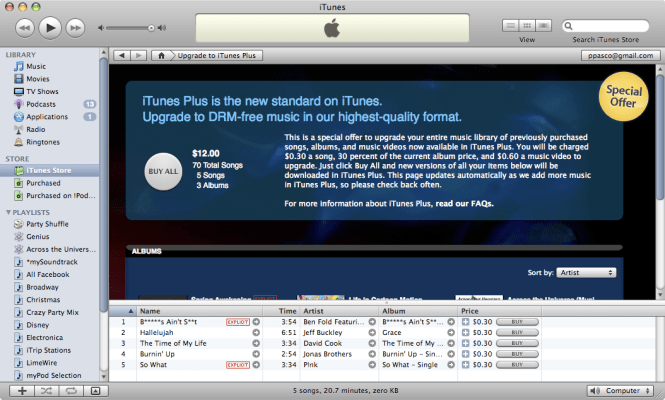A jury has found in favor of Apple in a lawsuit brought against it for DRM practices employed in iTunes, which claimed it was in violation of U.S. antitrust regulations owing to decisions it made regarding software updates. The case essentially alleged that iTunes updates, including 4.7, 7.0 and 7.4 were created strictly to introduce FairPlay updates to block competing services from offering music for users to play on their Apple music player hardware.
The jury in the case has returned a verdict that basically states those updates did indeed offer meaningful improvements to Apple’s media player software, and were not offered only to help Apple maintain a perceived monopoly by blocking others, including RealNetworks, from also selling digital media for use with iPods.
In the early days of iTunes, the software prevented iPod devices from working with content secured from sources other than the iTunes music store. FairPlay DRM was discontinued for attains music back in 2009, after Steve Jobs sent an open letter to music labels in 2007 advocating they stop requiring the use of DRM with digital music to give users the freedom of playing their music wherever they want it. Users were given the option to upgrade their tracks to DRM-free versions for $0.30 per song when Apple got rid of it in the iTunes Store, and iTunes Match allows them to replace locked versions en masse.
While Jobs opposed DRM from record companies, Apple still used its own version (FairPlay) and didn’t make it available to competitors. Licensing FairPlay would’ve allowed others, including RealNetworks, to sell songs that would work on iPods and Macs authorized via iTunes, but Apple ad and media store boss Eddy Cue testified during this trial that while they considered offering licensing, they couldn’t find a way to make it consistently workable.
When companies like RealNetworks tried to mimic Apple’s DRM on their own, subsequent updates, including the ones named in the suit, would break playback of tracks using non-genuine versions of FairPlay, hence the complaint. The verdict here indicates that the jury in this case sides with Apple, which maintains that these updates weren’t designed specifically to break compatibility with FairPlay clones, but that said compatibility was instead broken as a consequence of other improvements made with each new version of iTunes.
